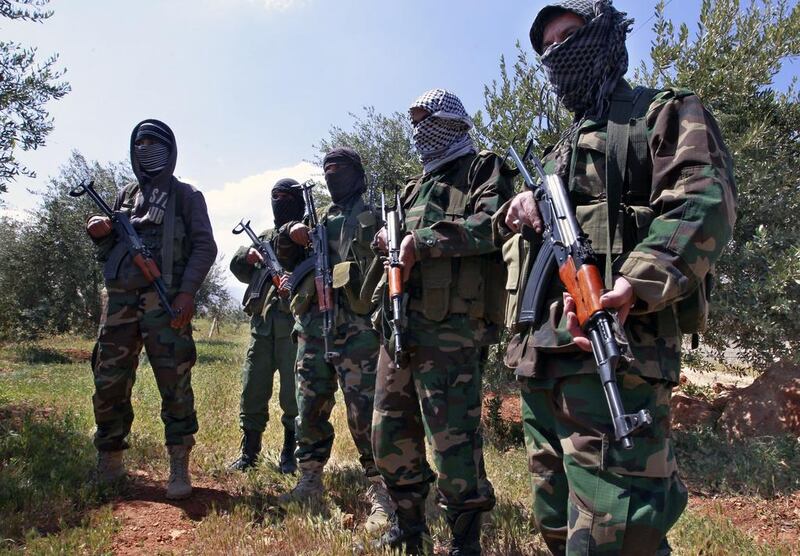BEIRUT // Alarmed at the sweeping advances in Iraq by Sunni militants, Lebanon’s Shiite Hizbollah movement is dispatching reinforcements to areas in Syria it helped wrest away from rebels fighting the regime of president Bashar Al Assad.
The build-up comes as Iraqi-Shiite militiamen battling alongside Hizbollah and Assad regime troops are leaving the area, near Lebanon's north-eastern border, and returning to Iraq to fight an insurgency led by the Islamic State, said Hizbollah military commanders and fighters from the group.
Speaking to The National, the militants, who have served multiple tours in Syria, said the civil war there and Hizbollah's involvement in it would be prolonged because of the Islamic State offensive.
“I’d be lying if I told you we wouldn’t be there for much longer,” said one Hizbollah fighter who lives in Beirut and who regularly goes to fight in Syria. “We will be there for years, and what happened in Iraq shows why we need to be there.”
Hizbollah’s leader, Hassan Nasrallah, indicated late last year that he had no plans to change course despite calls from opponents in Lebanon for the group to end its military involvement in Syria.
An increase in Hizbollah reinforcements in Syria shows how sectarian tensions have escalated throughout the region because of the Islamic State advance across Iraq and eastern Syria, which has seen extreme brutality used against Shiites and opponents of the group.
“We have to protect ourselves from this savagery,” said the fighter, who declined to specify details of Hizbollah forces operating in Syria.
There also are concerns about the Islamic State’s plans for Lebanon, where brittle sectarian relations have been strained to a breaking point by Syria’s three-year civil war. The conflict has killed more than a 150,000 people and driven about a million refugees to Lebanon, which previously had a population of just 4.3 million.
In response, Hizbollah has boosted coordination with Lebanon’s military and security agencies, including in the mountainous areas in north-eastern Lebanon where Sunni militants have staged attacks on Assad regime troops and Hizbollah strongholds in Lebanon.
Late last month, militants carried out three suicide attacks in Lebanon including one against Beirut's Duroy Hotel in retaliation to Hizbollah's intervention in Syria.
The Islamic State, which was previously known as the Islamic State in Iraq and Levant before declaring a caliphate late last month, purportedly claimed the hotel bombing.
There have been scores of other attacks in Lebanon against Shiite and other targets, including a double suicide bombing on Iran’s embassy in Beirut last November that killed 23 people.
Hizbollah’s intervention in Syria has angered many in Lebanon including Sunnis who largely support the rebellion against the Assad regime. The group has also been criticised for abandoning its raison d’être of confronting Israel.
Yet its involvement in Syria has helped turn the tide of war in favour of the Assad regime, clearing a strategic corridor extending from Syria’s western coastline to Damascus. That preserved Mr Al Assad’s ability to manage vital supplies of weapons to Hizbollah that include Iranian-made rockets that can reach deep inside Israel.
“Hizbollah has largely accomplished much of its goals by winning strategic border areas with Syria,” said Talal Atrissi, a sociology professor at Lebanese University. But its fighters will remain for some time in part because of “what we’ve witnessed with the occupation of Mosul and huge areas of Iraq by [the Islamic State]”.
Hizbollah intelligence officials also have boosted their joint operations with Iran inside Iraq, according to a Hizbollah commander who had fought in border areas with Syria. He said his brother-in-law was one of those dispatched last month to Baghdad and Samarra to monitor the Islamic State’s movements and coordinate with Iraq’s Iranian-backed Shiite militias, including Asa’ib Ahl Al Haq. The group has fought rebels in Syria and also carried out numerous attacks targeting United States forces during the country’s occupation of Iraq.
“We have had a presence there for a long time, of course, but it’s increasing for obvious reasons,” said the commander. He declined to comment on whether Hizbollah has taken on a combat role in Iraq.
Randa Slim, director of the Washington-based Middle East Institute, said the Islamic State threat had “reinforced in Lebanon Hizbollah’s narrative that the extremist ‘takfiri’ groups in Syria threaten the whole of Lebanon” and “that their intervention in Syria was preventive”.
She described Hizbollah’s involvement in Syria as “mission creep” where the “longer it stays in, the more of its political and military assets will be invested in waging the fight there”.
The common interest of thwarting the Islamic State may also produce more coordination between Hizbollah and Lebanon’s military and intelligence agencies.
Previously, they had been at odds in large part because of competing international backers, with Iran backing Hizbollah and Saudi Arabia backing Lebanon's military.
“There is extensive cooperation due to some sort of tacit Iranian-Saudi [Arabia] temporary understanding over containing the spillover of the Syria crisis into Lebanon,” said Andrew Tabler, an expert on Syria and Lebanon at the Washington Institute for Near East Policy.
In the predominantly Shiite suburbs of south Beirut, Abu Ibrahim, counted the costs of Hizbollah’s foray into Syria. Multiple car bombs have rocked his neighbourhood and the labyrinth of checkpoints set up afterwards have choked the area’s businesses. Two of his cousins and a close friend have died fighting for Hizbollah in Syria.
“Everyone here knows someone who was killed there,” said the 48-year-old father of two young children. “But if we don’t fight these radicals there, they’ll be killing us here,” he said.
hnaylor@thenational.ae





